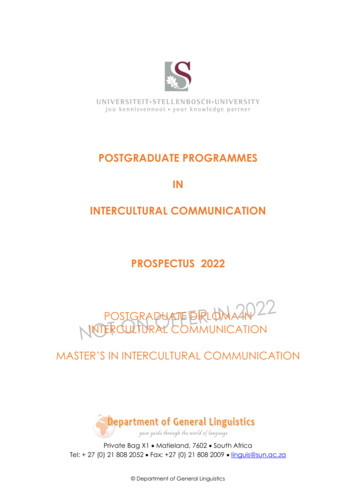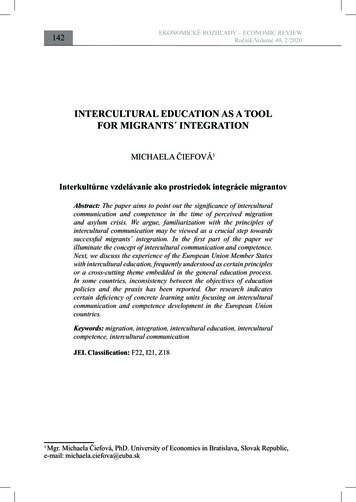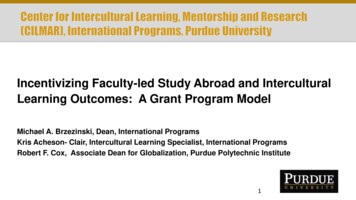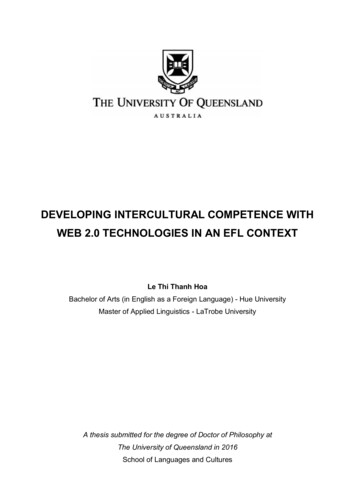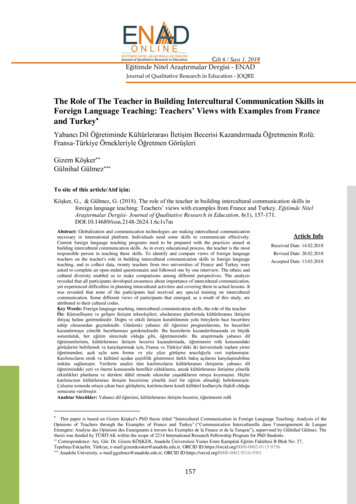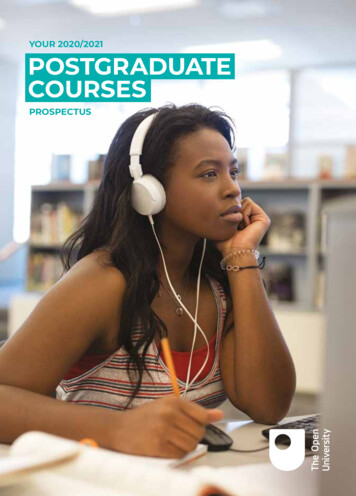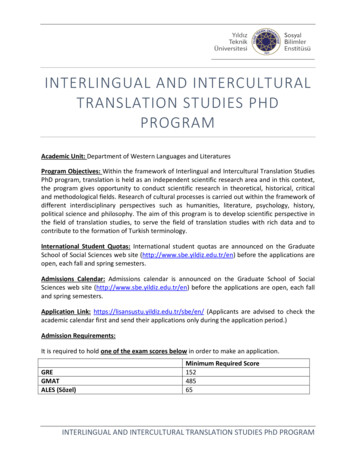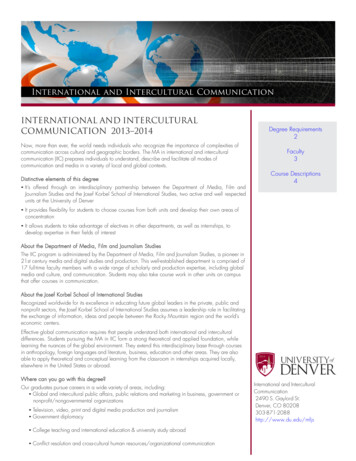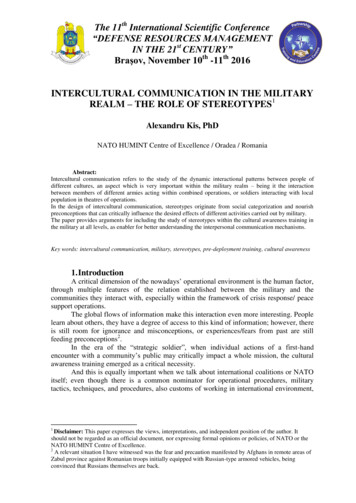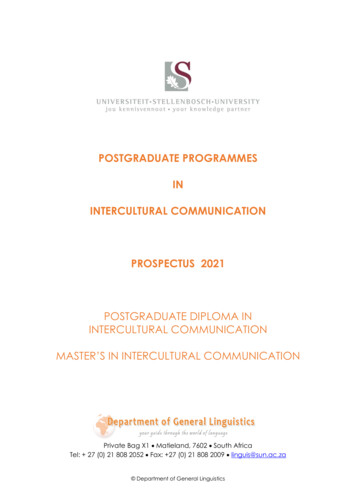
Transcription
POSTGRADUATE PROGRAMMESININTERCULTURAL COMMUNICATIONPROSPECTUS 2021POSTGRADUATE DIPLOMA ININTERCULTURAL COMMUNICATIONMASTER’S IN INTERCULTURAL COMMUNICATIONPrivate Bag X1 Matieland, 7602 South AfricaTel: 27 (0) 21 808 2052 Fax: 27 (0) 21 808 2009 linguis@sun.ac.za Department of General Linguistics
TABLE OF CONTENTSSECTION A: GENERAL INFORMATION .11.2.3.4.5.6.7.8.9.10.11.GENERAL . 1STAFF PROFILE . 2AIMS . 11MODES OF TUITION . 12LANGUAGE OF TUITION . 13DURATION OF THE PROGRAMMES . 13ACQUISITION OF PRESCRIBED TEXTS. 13FEES . 14BURSARIES . 14APPLICATION AND SELECTION . 14REGISTRATION . 15SECTION B: POSTGRADUATE DIPLOMA IN INTERCULTURAL COMMUNICATION .171.2.3.4.5.AIMS . 17REQUIREMENTS FOR ADMISSION . 17STRUCTURE AND CONTENT OF THE PROGRAMME . 173.1Module 1 (30 credits) . 183.2Module 2 (30 credits) . 183.3Module 3 (30 credits) . 183.4Module 4 (30 credits) . 18PROMOTION . 19SPECIAL ASSISTANCE . 19SECTION C: MASTER’S IN INTERCULTURAL COMMUNICATION.211.2.3.4.5.AIMS . 21REQUIREMENTS FOR ADMISSION . 21STRUCTURE AND CONTENT OF THE PROGRAMME . 22PROMOTION . 22DOCTORAL STUDIES . 23Private Bag X1 Matieland, 7602 South AfricaTel: 27 (0) 21 808 2052 Fax: 27 (0) 21 808 2009 linguis@sun.ac.za Department of General Linguistics
1SECTION A:GENERAL INFORMATION1.GENERALIn Southern Africa, communication regularly takes place across the boundaries drawnby the region’s rich cultural and linguistic diversity. Such communication is found, forinstance, where people with different languages communicate using another sharedlanguage, or where people with the same first language but different culturescommunicate with one another. These and other forms of intercultural communication– which are not limited to Southern Africa, but are increasingly found on a global level– occur in a wide range of domains (e.g. health, education, business, public affairs,law, religion, and private life) and often result in misunderstandings across culturescaused by different conceptions of politeness, conversational interaction, etc. Itstands to reason that success in the various domains presupposes an understanding ofthe central features of intercultural communication.Clearly, then, there is a great need for postgraduate linguistics programmes in whichthe phenomenon of intercultural communication is studied from a range ofdisciplinary perspectives. The Department of General Linguistics at StellenboschUniversity (henceforth referred to as “the Department”) offers two such programmes,the only ones of their kind in South Africa: (i) a Postgraduate Diploma (PGDip) inIntercultural Communication, and (ii) a Master’s (MA) in InterculturalCommunication. The focus of these two programmes is linguistic in a dual sense –*they are concerned with the linguistic means of intercultural communication, and*they deal with these means from perspectives offered primarily by variouslinguistic (in an inclusive sense) disciplines.The details of the PGDip programme are given in section B below, and those of theMA programme in section C.The programmes have been designed for (i) professionals who routinely communicateacross cultural and linguistic boundaries or who are responsible for training, educatingand managing others who have to engage in such communication, as well as for (ii)people who have an academic interest in the phenomenon of interculturalcommunication. By providing students with the knowledge and skills needed to gainan understanding of this phenomenon and to manage the relevant differences andresulting misunderstandings in intercultural communication contexts, theseprogrammes enable graduates to practise their (intended) professions with greaterexpertise and satisfaction. At the same time, given their specific content, bothprogrammes are intended to contribute to the strategic priority of understanding,managing and furthering the rich cultural diversity of Southern Africa.Since its inception in 2005, many people have benefited intellectually andprofessionally from the content of the PGDip and the MA in InterculturalCommunication programmes. The content is continually revised to keep up with newresearch findings and insights, the changing needs of students, and the requirementsof various professions. A number of factors ensure that a high standard is maintained –*Individual supervision: Every student, no matter where he or she lives, receivesintensive personal supervision.
2*Experienced lecturers: The staff has gained a wealth of experience in theirsupervision of hundreds of postgraduate students since 1986.*High-calibre students: Because of their excellent reputations, the programmesattract students who set high standards.*An internationally well-established department: The Department is highlyregarded internationally and is involved in several research and exchangeprojects with foreign tertiary institutions, including universities in England,Sweden and The Netherlands. Staff members also regularly attend and deliverpapers at local and international conferences. The Department's two journals,SPiL and SPiL Plus, are both accredited with the National Department ofHigher Education and publish contributions by leading local and overseasscholars. Since 2011, these journals have also been available online. Booksand monographs by staff members have also been published by respectedlocal and international publishing houses.*External evaluation: The content, organisation, requirements and other aspectsof the programmes are subjected to peer evaluation on a regular basis.A NOTE REGARDING OUR POSTGRADUATE DIPLOMA PROGRAMMES:Since 2019, our two postgraduate diploma programmes (in InterculturalCommunication and Second Language Studies) have been offeredalternately year upon year. In 2021, the Postgraduate Diploma inIntercultural Communication programme will be the sole postgraduatediploma programme offered for that year. The Postgraduate Diploma inSecond Language Studies programme will only be offered again in 2022*.Please contact the Department for further information before you apply.*This is subject to change at the discretion of the Department of General Linguistics.2.STAFF PROFILEStudents are supervised by the following lecturers in the Department:Prof. Manne Bylund(Professor and Director of theMultiCog Laboratory)Highest Qualifications: PhD 1 (Stockholm University) entitled “Agedifferences in first language attrition: Amaturational constraints perspective”. PhD 2 (Stockholm University) entitled“Conceptualización de eventos enespañol y en sueco. Estudios sobrehablantes monolingües y bilingües”.
3Fields of academic expertise:Psycholinguistics, multilingualism, language and cognitionCurrent research project(s) as at December 2019: Unravelling the multilingual mind Pitch in language and perception Lexical processing and representation in bilingualism Colour terms and colour categorisationRecent completed research projects: Time in language and thoughtLinguistic diversity and motion event cognitionThe effects of age of acquisition and bilingualism on L2 proficiencyRecent publications:Athanasopoulos, P. & Bylund, E. (in press). Whorf in the wild: Naturalistic evidence fromhuman interaction. Applied Linguistics.Bokander, L. & Bylund, E. (in press). Probing the internal validity of the LLAMA languageaptitude tests. Language Learning.Bylund, E., Gygax, P., Samuel, S. & Athanasopoulos, P. (in press). Back to the future? Therole of temporal focus for mapping time onto space. Quarterly Journal ofExperimental Psychology.Bylund, E., Abrahamsson, N., Hyltenstam, K. & Norrman, G. (2019). Revisiting the bilinguallexical deficit: The impact of age of acquisition. Cognition 182, 45–49.Recent MA supervision: T. Dick. 2019. Decision making in a second language J. McLoughlin. 2019. Lexical processing in Afrikaans-English bilinguals (with R. Berghoff) M. Parshotam. 2019. Colour categorisation in isiXhosaCurrent PhD supervision (as at December 2019) J. Crossley. The influence of orthography on the mental timeline S. Gultzow. Motion events in speech and gesture K. Jonas. The influence of isiXhosa noun classes on cognitive processing A. Ogelo. Linguistic categories and cognition in Dholu M.-L. van Heukelum. Syntactic attrition in L1 Afrikaans (with T. Biberauer)Recent completed PhD supervision: R. Berghoff. 2019. Sentence processing in Afrikaans-English bilinguals
4Prof. Frenette Southwood(Associate Professor andChair of the Department)Highest Qualification:PhD (Radboud University Nijmegen), entitled“Specific language impairment in Afrikaans:Providing a Minimalist account for problemswith grammatical features and word order”.Fields of academic expertise:Child language, language impairmentCurrent research project(s) as at December 2019: Early childhood language development and family socialisation in three SouthAfrican language communities Towards a dialect-neutral evaluation instrument for the language skills of SouthAfrican English and Afrikaans-speaking children Linguistically fair and culturally relevant early child language assessment:Developing the MacArthur-Bates Communicative Developmental Inventory inseven South African languagesRecent completed research projects:Receptive and expressive activities for language therapyRecent publications:Van Heukelum, M.L. & Southwood, F. (In press.) Intercultural communicativecompetence is essential for students of international business – but can it be taught?The case of third-year BCom students. South African Journal of Higher Education.Ssentanda, M.E., Huddlestone, K. & Southwood, F. 2019. “800 Words in Three Years”:Curricula Expectations Versus Teachers’ Opinions and Practices in Teaching Englishin Rural Primary Schools in Uganda. Language Matters 50(2): 141–163.Haman, E., M. Łuniewska, P. Hansen, H.G. Simonsen, S. Chiat, J. Bjekić, A. Blažienė, K.Chyl, I. Dabašinskienė, P. Engel de Abreu, N. Gagarina, A. Gavarró, G. Håkansson, E.Harel, E. Holm, S. Kapalková, S. Kunnari, C. Levorato, J. Lindgren, K. Mieszkowska, L.Montes Salarich, A. Potgieter, I. Ribu, N. Ringblom, T. Rinker, M. Roch, D. Slančová, F.Southwood, R. Tedeschi, A. Müge Tuncer, Ö. Ünal-Logacev, J. Vuksanović and S.Armon-Lotem. 2017. Noun and verb knowledge in monolingual preschool childrenacross 17 languages: Data from cross-linguistic lexical tasks (LITMUS-CLT). ClinicalLinguistics & Phonetics 31(11–12): 818–843.Nel, J. & Southwood, F. 2016. The comprehension and production of quantifiers inisiXhosa-speaking Grade 1 learners. South African Journal of CommunicationDisorders 63(2): 1–10.
5Potgieter, A.P. & Southwood, F. 2016. A comparison of proficiency levels in four-yearold monolingual and trilingual speakers of Afrikaans, isiXhosa and South AfricanEnglish across SES boundaries, using LITMUS-CLT. Clinical Linguistics & Phonetics30: 87–100.Southwood, F. & D'Oliveira, E. 2016. The language scripts of pre-school children andof the language intervention volunteer: Mismatched discourses? StellenboschPapers in Linguistics Plus 49: 249–263.Van Dulm, O. & Southwood, F. 2016. Does socioeconomic level have an effect onschool-age language skills in a developed country?. Stellenbosch Papers inLinguistics Plus 49: 59–84.Southwood, F. & Van Dulm, O. 2016. Unlocking later-developing language skills in olderchildren by means of focused language stimulation. Per Linguam 32(2): 30–46.Ssentanda, M.E., Huddlestone, K & Southwood, F. 2016. The politics of mother tongueeducation: The case of Uganda. Per Linguam 32(3): 60–78.Recent MA supervision: A.A. Grové. 2019. The English language abilities of Grade R learners in andEnglish-medium South African classroom: Is there a correlation betweenobjective measurements and teacher and parent perceptions? S. Coetzee. 2018. The comprehensibility of plain language for second languagespeakers of English at a South African college of further education and training. M. Manca. 2018. Language attitudes in pre-adolescent multilinguals: Acomparison of five data elicitation techniques. H. Stromvig. 2018. The functions of teacher code switching in classrooms, andteachers’ perceptions towards this practice: A case study of siSwati-Englishinteractions in a semi-urban high school in Eswatini. J. Van Stryp. 2018. The effect of multilingual glossaries of metacognitive verbs onimproving assessment performance in first-year students: a case study at a SouthAfrican university of technology. B. Kamwi. 2017. Student expectations and perceptions of the usefulness of theirlinguistic repertoires for achieving social integration and academic success at aninternational university in Namibia.Current PhD supervision (as at December 2019): M. Kajombo. Communicating cultural taboo and women’s bodies: Asociolinguistic study of speech codes in gynaecological consultations in Blantyre,Malawi. (Co-supervisor.) A. Nowezu. Investigating the language practices and literacy practices ofisiXhosa families in Western Cape homes: An ethnographic approach. (Cosupervisor.)Recent completed PhD supervision: M. White. 2018. Processes underlying language development and rate of Englishlanguage acquisition, with specific reference to ELLs in a multilingual SouthAfrican Grade R classroom. S. Nahayo. 2017. Construction of linguistic identities among cross-bordercommunities: The case of Samia of Uganda and Samia of Kenya. (Co-supervisor.
6 J. Nel. 2015. The comprehension and production of later developing languageconstructions by Afrikaans-, English- and isiXhosa-speaking Grade 1 learners.Dr Marcelyn Oostendorp(Senior Lecturer)Highest Qualification:PhD (Stellenbosch University) entitled “Effectsof the second language on the first:Investigatingthedevelopmentof‘conceptual fluency’ of bilinguals in a tertiaryeducation context”.Fields of academic expertise:Primary: Multilingualism, multimodal discourse analysis, sociolinguisticsDeveloping interests: decolonial theory, alternative academic writing practices,language and foodCurrent research project(s) as at December 2019: Image-ining multilingualism in transformation: The linguistic repertoires ofunderrepresented students in higher education (2017–2021). Funded by the AndrewMellon Foundation small grants (as part of Unsettling Paradigms suprabid) Re-imagining Afrikaans: Past, present and future Foodscapes and the multimodal construction of personhood, locale and timeRecent completed research projects:Semiotic diversity in educational contexts in the Western Cape (2014-2016). Fundedby South Africa’s National Research Foundation (NRF) of Competitive Support forUnrated Researchers schemeRecent publications:Oostendorp, M., Duke, L., Mashazi, S. & Pretorius, C. (In press.) When linguists becomeartists: An exercise in boundaries, borders and vulnerabilities. In Bock, Z. & Stroud,C. (Eds.) Recapturing voices in higher education: Contributions from the South.London: Bloomsbury.Oostendorp, M. (In press.) Linguistic citizenship and non-citizens: Of utopias anddystopias. In Williams, Q., Deumert, A. & Milani, T. (Eds.) Multilingualism andlinguistic citizenship: Education, narrative and episteme. Clevedon, UK:Multilingual Matters.
7Haese, A., Costandius, E. & Oostendorp, M. 2018. Fostering a culture of reading withwordless picturebooks in a South African context. International Journal of Art andDesign Education 37(4): 587–598.Oostendorp, M. 2018. Extending resemiotization: Time, space and body in discursiverepresentation. Social Semiotics 28(3): 297–314.Oostendorp, M. 2017. “As an undergrad I don’t have the right to an opinion”:Reconstructing students as creative meaning-makers in the Applied Englishlanguage classroom”. RELC: Journal of Language Learning and Teaching 48(2):278–285.Recent MA supervision: T. Bates. 2019. Linguistic diversity in a rural Northern Cape municipality: Asociolinguistic investigation of Gamagara local municipality. S. Roman. 2019. What Kaaps brings to the table: A sociolinguistic analysis of theintersection between language, food, and identity in Vannie Kaap memes. S.-L. Williams. 2018. The discursive construction of the language ideologicaldebate at Stellenbosch University: A comparison of the English and Afrikaansprinted press. M. Nel. 2017. Student voice and agency in Masters’ thesis writing. D. Zimny. 2017. Language and place-making: Public signage in the linguisticlandscape of Katutura, Namibia. C. Roets. 2016. Racialised discourse in a former Model C school: Narratives ofinclusion and exclusion. J. Carolissen. 2016. Afrikaans on the Cape Flats: Performing cultural linguisticidentity in “AFRIKAAPS".Recent completed PhD supervision: V. Dlamini-Akintola. 2019. The discursive construction of identity in youngoffenders’ narratives in Swaziland. A. Le Roux. 2017. An exploration of the potential of wordless picture books toencourage parent-child reading in the South African context. S. Nahayo. 2016. Construction of language identities among cross-bordercommunities: The case of Samia of Uganda and Samia of Kenya.Current PhD supervision (as at December 2019): A. Anthonie. Investigating the potential of heteroglossic teaching and learningpractices in an underrepresented higher education setting: A case study of a SouthAfrican technical and vocational education and training college (main supervisor). C. Klingbeil. Time, space and identity in Pope memes: A multimodal analysis(main supervisor). R. Abiyo. Literacy practices in and out of school in multilingual Kenya: A casestudy of Tana River County (main supervisor). A. Nozewu. Investigating the language and literacy practices of isiXhosa familiesin Western Cape homes: An ethnographic approach (main supervisor).
8Dr Kate Huddlestone(Lecturer)Highest Qualification:PhD (University of Utrecht) entitled “Negativeindefinites in Afrikaans”.Fields of academic expertise:Language structure, language variation, pragmatics, sign language linguisticsCurrent research project(s) as at December 2019: Negation in South African Sign Language Grammatical and lexical variation in South African Sign Language Syntax-pragmatic interface in Afrikaans and South African English (Pragmaticmarkers in Afrikaans & South African English) Building a corpus of spoken Standard AfrikaansRecent completed research projects:Negative indefinites in AfrikaansLanguage contact in computer-mediated communicationRecent publications:Huddlestone, K. 2017. A preliminary look at negative constructions in South AfricanSign Language: Question-Answer clauses. Stellenbosch Papers in Linguistics 48:93–104.Berghoff, R. & Huddlestone, K. 2016. Towards a pragmatics of non-fictional narrativetruth: Gricean and relevance-theoretic perspectives. Stellenbosch Papers inLinguistics Plus 49: 129–144.Huddlestone, K. & de Swart, H. 2014. A bidirectional Optimality Theoretic analysis ofmultiple negative indefinites in Afrikaans. Stellenbosch Papers in Linguistics 43:137–164.Huddlestone, K. & Fairhurst, M. 2013. The pragmatic markers “anyway”, “okay”, and“shame”: A South African English corpus study. Stellenbosch Papers in LinguisticsPlus 42: 93–110.
9Recent MA supervision: E. de Villiers. 2019. Towards a Minimalist analysis of imperatives in Afrikaans: A firstsurvey of the empirical and theoretical terrain. A. Palmer. 2019. Developing a Sentence Repetition Test for the evaluation ofDeaf children’s use of South African Sign Language. A. Van Niekerk. 2019. A lexical comparison of South African Sign Language andpotential lexifier languages. N. Lochner. 2018. “So we were just like, ‘ok’”: The discourse markers like and just inthe speech of young South Africans. S. Strauss. 2017. Afrikaans-English code-switching among high school learners in arural Afrikaans-setting: Comparing the GET and FET phases. JJ. Meyer. 2016. A nominal-shell analysis of restrictive relative clause constructionsin Afrikaans. (Co-supervisor.)Recent completed PhD supervision: A. Gauché. 2017. A relevance-theoretic analysis of selected South AfricanEnglish pragmatic markers and their cultural significance. S. Nakijoba. 2017. Pragmatic markers in Luganda-English bilingual spokendiscourse: A relevance-theoretic approach.Current PhD supervision (as at December 2019): D. Nyakana. Multilingual acquisition of determiner phrases in L2 English and L3French by Swahili speakers in Tanzania.Dr Lauren Mongie(Lecturer)Highest Qualification:PhD (Stellenbosch University) entitled “Thediscourse of liberation: The portrayal of thegay liberation movement in South Africannews media from 1982 to 2006”.Fields of academic expertise:Critical Discourse Analysis; language, gender and sexuality; language and socialmedia; intercultural communication in diverse settingsCurrent research project(s) as at December 2019: The representation of beggars in the mediaThe representation of eating disorders on pro-ED websitesInterdepartmental research project on homelessness in Stellenbosch
10Recent publications:Mongie, L.D. and Plato, T. (In preparation.) ‘Gayle brings the gays together’: A Queeranalysis of linguistic performativity and the construction of identity and belongingthough the use of Gayle. Journal of Language and Sexuality.Mongie, L.D. 2016. Critical discourse analysis as queer linguistics: Religious pro- andanti-LGBT equality framing and counterframing in two letter to the editor in the“City Press”. Stellenbosch Papers in Linguistics 49: 23–43.Mongie, L.D. 2015. The discourse of liberation: Frames used in characterising the gayliberation movement in two South African newspapers. Stellenbosch Papers inLinguistics 46: 67–83.Recent MA supervision S. Minaar. 2019. ‘Have your baby and get out. We need this bed for somebodyelse’: Compassionate intrapartum communication – A discourse analysis oflanguage use during labour in South African public and private maternity settings. M. Mohlomi. 2019. ‘Must they sing ‘Nkosi Sikelel’ iAfrika or must they return fire?’: Acritical analysis of discourses surrounding African migrants on South African onlinenews and Facebook. L. Wilkinson. 2018. ‘Crazy, mad and dangerous’: A critical discourse analysis of the(re)construction of mental illness in South African magazines. N. du Plessis. 2017. Young South African adults’ attitudes towards the use ofobscene language.Current PhD supervision (as at December 2019): M. Kajombo. Taboo language and women's bodies: A sociolinguistic study ofspeech codes used in gynaecological consultations in Blantyre, Malawi.Dr Robyn Berghoff(Lecturer)Highest Qualification:PhD (Stellenbosch University) entitled“Syntactic processing in English–Afrikaansbilinguals”.Fields of academic expertise:Psycholinguistics, multilingualism, language structure
11Current research project(s) as at December 2019:Flipping the switch: Testing structural constraints on the priming of code-switching inhigh-proficiency English-Afrikaans bilinguals (collaboration with Marianne Gullberg,Lund University, Sweden; and Gerrit Jan Kootstra, Radboud University Nijmegen, theNetherlands)Recent completed research projects:Syntactic processing in English-Afrikaans bilinguals (Stellenbosch University PhD)Cross-categorial degree modification in Afrikaans (Utrecht University MA)Recent publications:Berghoff, R., R. Nouwen, L. Bylinina and Y. McNabb. 2019. Degree hoff, R. 2017. Movement in the Afrikaans left periphery: A view from anti-locality.Stellenbosch Papers in Linguistics Plus 48: 35–50.Berghoff, R. and K. Huddlestone. 2016. Towards a pragmatics of non-fictionalnarrative truth: Gricean and relevance-theoretic perspectives. StellenboschPapers in Linguistics Plus 49: 129–144.Recent MA supervision J. Mcloughlin. 2019. Parallel processing in Afrikaans-English bilinguals: An eyetracking study. (Co-supervisor.) D. Zimny. 2017. Language policy and place-making: Public signage in thelinguistic landscape of Katutura, Namibia. (Co-supervisor.)Where necessary, experts from outside the Department may act as study leaders incertain modules.The postgraduate programme coordinator responsible for all administrative matters is:Lauren Onraët. MA (Stellenbosch).For further information about the research done by students and staff members ofthe Department over the years, please consult the SUN Scholar open accessresearch repository hosted on Stellenbosch University Library’s website.3.AIMSAdopting an interdisciplinary perspective, both programmes are intended, as a generalaim, to equip students who are in careers that involve communication across culturaland linguistic boundaries, or who are planning to enter into such a career, with –*a sound knowledge and understanding of current insights into languagerelated aspects of intercultural communication;
12*a thorough understanding of the theoretical approaches and researchmethods which are used to examine language-related aspects of interculturalcommunication; and*a knowledge base that enables them to identify and convey theirunderstanding of problematic issues in intercultural communication, and tohelp solve such issues in the private and public sectors.To achieve this general aim, students are instructed in –*the linguistic concepts and principles required for analysing and understandingproblematic aspects of various intercultural communication phenomena;*the patterns of thought, forms of argumentation and methods of researchthat characterise the study of these phenomena within a particulartheoretical framework; and*general intellectual norms such as those of conceptualreasonedness, coherence, clarity of formulation, etc.precision,The specific aims of the two programmes are stated below in sections B and C.The programmes are both highly relevant in our multicultural and multilingual society.Besides enhancing the general intellectual skills and professional expertise ofstudents, the programmes are also intended to make a significant contribution to thedevelopment of understanding and tolerance among people of different languageand cultural groups. The successful completion of the MA programme also formallypaves the way for possible doctoral studies in linguistics.4.MODES OF TUITIONThe programmes make provision for three modes of tuition –*technologically-mediated tuition for off-campus students;*on-campus tuition; or*a combination of off-campus and on-campus tuition.All PGDip and new MA students are required to attend a compulsory contact sessionheld in the Department at the beginning of the year. Except for this session, offcampus students are not required to attend face-to-face lectures or seminars inStellenbosch, and contact with such students is maintained by email, telephone,Skype, and other technologically-mediated ways. Students who are on campus maybe required to attend lectures and seminars. All students are encouraged to contactthe responsible lecturer(s) regularly for individual support.The compulsory on-campus contact session is planned with consideration of the timemost suitable for students who hold full-time employment and/or do not live inStellenbosch. The general aim of this session is to provide students with the opportunity tomeet with the lecturers and research supervisors, to attend lectures and seminars, andto get (better) acquainted with information retrieval (library services, electronicsearches, etc.). The presentations intended for the students of the PGDip programmeduring this contact session specifically aim to –
13*provide technical information on writing good assignments;*provide a general introduction to the research field of interculturalcommunication; and*teach PGDip students how to decide on a particular theme or topic forpostgraduate researc
Intercultural Communication, and (ii) a Master's (MA) in Intercultural Communication. The focus of these two programmes is linguistic in a dual sense - * they are concerned with the linguistic means of intercultural communication, and . PhD 2 (Stockholm University) entitled "Conceptualización de eventos en español y en sueco. Estudios .
